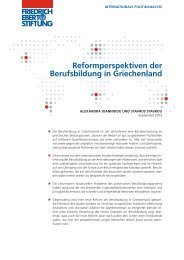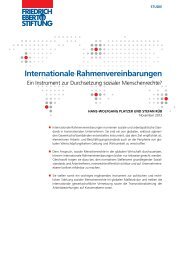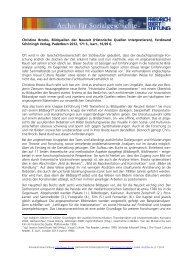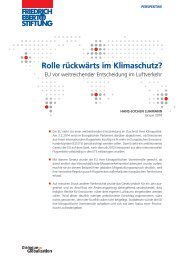Women - men - gender. - Bibliothek der Friedrich-Ebert-Stiftung
Women - men - gender. - Bibliothek der Friedrich-Ebert-Stiftung
Women - men - gender. - Bibliothek der Friedrich-Ebert-Stiftung
You also want an ePaper? Increase the reach of your titles
YUMPU automatically turns print PDFs into web optimized ePapers that Google loves.
20 IN CONVERSATION WITH DR. CHRISTINE BERGMANN<br />
“Changing a mind-set always takes a long time”<br />
In Conversation with Dr. Christine Bergmann<br />
She was a Senator in Berlin, and in<br />
1998, she was the fi rst Minister for<br />
<strong>Wo<strong>men</strong></strong> and Family Affairs in the<br />
Coalition Govern<strong>men</strong>t of SPD and<br />
the Green Party of Germany. She is<br />
a member of the Executive Board of<br />
the <strong>Friedrich</strong> <strong>Ebert</strong> <strong>Stiftung</strong>, and is<br />
a passionate champion of a mo<strong>der</strong>n<br />
wo<strong>men</strong>’s policy. She believes <strong>gen<strong>der</strong></strong><br />
mainstreaming is a necessary comple<strong>men</strong>t<br />
for such but not a substitute.<br />
“Equal pay for equal work”.<br />
For decades, this has been the<br />
demand of wo<strong>men</strong> workers and<br />
trade unionists, yet wo<strong>men</strong> continue<br />
to earn one-fi fth less than <strong>men</strong>.<br />
Why are wo<strong>men</strong> not protesting<br />
more vehe<strong>men</strong>tly?<br />
It’s scandalous that wo<strong>men</strong> continue to earn less than <strong>men</strong>, and, on<br />
this issue, Germany is particularly badly placed in international<br />
comparison. The difference in salaries between <strong>men</strong> and wo<strong>men</strong> is<br />
substantively higher in the old Bundeslän<strong>der</strong> (fe<strong>der</strong>al states) than in<br />
the new ones, although even there, there is no parity of pay. What is<br />
the reason for this, and what must wo<strong>men</strong> do to ensure <strong>gen<strong>der</strong></strong><br />
equitable pay<strong>men</strong>t? There are several answers to these questions:<br />
1. Traditional wo<strong>men</strong>’s professions are traditionally poorly paid. I’m<br />
thinking here, for example, of the service ren<strong>der</strong>ed by wo<strong>men</strong> to<br />
other people, such as, nursing, child care etc. Protest, in this case,<br />
means that wo<strong>men</strong> must become members of the trade union collective<br />
agree<strong>men</strong>t committee. <strong>Wo<strong>men</strong></strong> must also realize that they<br />
have to take the lead in ensuring that subsistence level legal minimum<br />
wages are fi xed.<br />
2. Taking a break from work, particularly a long one, and part-time<br />
work are hindrances to career advance<strong>men</strong>t and do not lead to<br />
well-paid positions. This brings us to, one, the problem of equitable<br />
distribution of familial and professional work between <strong>men</strong> and<br />
wo<strong>men</strong>. One has to think differently even with regard to the workplace.<br />
Many executive positions can be held, even with shorter<br />
working hours. Yes, we can!<br />
3. Even if the fi rst two causes were no longer to apply, differences<br />
would still persist, as has been proven by the German Institute of<br />
Economic Research (DIW). Real discrimination still exists. In gene-

















